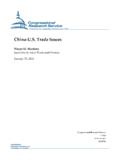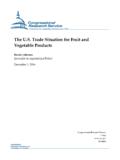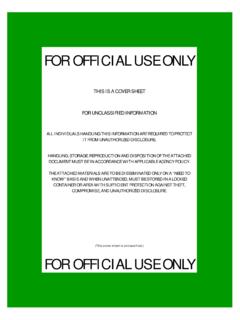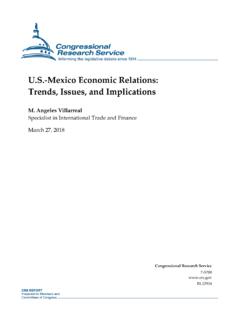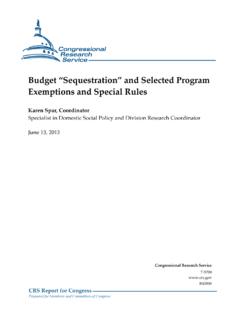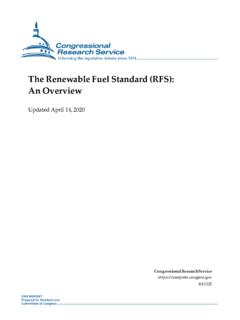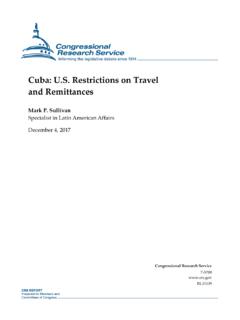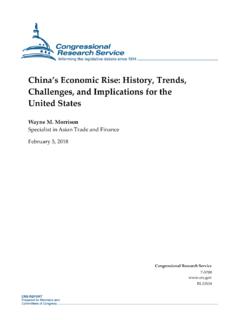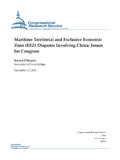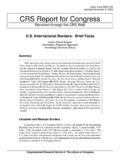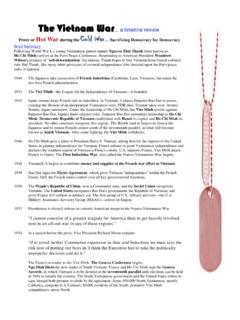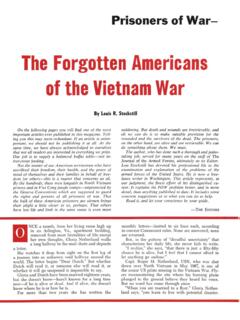Transcription of World War II Vietnam and Iraq - Federation of American ...
1 Interrogation World War II, Vietnam and iraq Interrogation World War II. Vietnam and iraq NDIC Press PCN 12010. national defense intelligence college Interrogation World War II, Vietnam , and iraq NATIONAL DEFENSE INTELLIGENCE COLLEGE. WASHINGTON, DC. September 2008. The views expressed in this book are those of the authors and do not reflect the official policy or position of the Department of Defense, the Defense Intelligence Agency, or any other agency of the Government. The National Defense Intelligence College supports and encourages research on intelligence issues that distills lessons and improves Intelligence Community capabilities to policy-level and operational consumers Interrogation: World War II, Vietnam , and iraq This book presents the work of three NDIC graduate students. All three worked under Professor John A. Wahlquist of the College, with external guidance from a group of scholars and recognized subject matter experts under the leadership of Dr.
2 Robert A. Fein of the Massachusetts Institute of Technology. The book follows the NDIC Press's Educing Information Interrogation: Science and Art, Foundations for the Future. By adding historical and practical context going back to policy and practice in interrogations during World War II, the Vietnam conflict, and the ongoing war in iraq , this newest volume contributes to the high-profile public dialogue on how military and civilian agencies can best obtain information from prisoners of war and other categories of legal and illegal combatants without compromising the principles upon which the nation was founded. This publication has been approved for unrestricted distribution by the Office of Security Review, Department of Defense. The editor acknowledges the gracious assistance of D. Lee Galloway III of the College's John T. Hughes Library, who was indispensable in obtaining copyright clearances for the illustrations in this book.
3 Electronic copies of this and other Center publications are available at For more information on this or other publications contact the editor at the address below or by commercial phone at (202) 231-4193. ii |. Editor Center for Strategic Intelligence Research ISBN 978-1-932946-23-9. Library of Congress Control Number 2008933262. CONTENTS. FOREWORD ..v COMMENTARY.. vii INTRODUCTION ..1. Mr. John A. Wahlquist, NDIC Faculty Interrogation of Japanese POWs in World War II: Response to a Formidable Challenge .. 17. Special Agent James A. Stone, Air Force Unveiling Charlie: Interrogators' Creative Successes Against Insurgents .. 77. Special Agent David P. Shoemaker, Air Force The Accidental Interrogator: A Case Study and Review of Army Special Forces Interrogations .. 147. Major Nicholas R. Dotti, Army APPENDIXES ..217-236. BIBLIOGRAPHY .. 237. INDEX .. 249. ABOUT THE AUTHORS.
4 253. | iii FOREWORD. Robert A. Fein, Member, Intelligence Science Board Chairman, ISB Study on Educing Information In September 2004, the Intelligence Science Board, an advisory board appointed by the Director of National Intelligence, initiated the Study on Educ- ing Information (EI). This study is an ongoing effort to review what is known scientifically about interrogation and other forms of human intelligence collec- tion and to chart a path to the future. As part of our efforts, we have worked closely with faculty and students of the National Defense Intelligence College. The NDIC Press published Educing Information: Interrogation: Science and Art, Foundations for the Future, a book based on Phase I of the Study on EI. Three students, Special Agent James Stone, Air Force; Special Agent David Shoemaker, Air Force; and Major Nicholas Dotti, Army, completed master's thesis studies during Academic Year 2006-07 on topics related to interrogation.
5 Each thesis is a remarkable and useful document. Special Agent Stone researched efforts during World War II to develop language and interrogation capacities to deal with our Japanese enemy. He found that military leaders, often working with civilian counterparts, cre- ated and implemented successful strategies, building on cultural and linguistic skills that substantially aided the war effort for the and its Allies. Special Agent Shoemaker studied the experiences of three successful interrogators during the Vietnam War. Like S/A Stone, S/A Shoemaker suggests that policymakers and practitioners have much to learn from professionals who served effectively for years in the field educing information. And like Stone, Shoemaker highlights the importance of a deep understanding of the language, psychology, and culture of adversaries and potential allies in other countries.
6 Major Dotti examined recent policy and practice with regard to tactical |v and field interrogations, especially with regard to the efforts of Special Forces soldiers in iraq . He concludes that the letter of current doctrine contradicts its intent. Major Dotti offers recommendations that he believes are both consis- tent with the intent of military doctrine and likely to increase the effectiveness of interrogation practices in the field. Each of these studies demonstrates that thoughtful, pragmatic research can produce stimulating and useful knowledge that may aid 21st century deci- sion-makers. Together these reports suggest that, by looking at both the distant and recent past, planners and operators can gain insights that may lead to future successes in educing information from adversaries. In publishing these studies, the National Defense Intelligence College continues to serve the military, law enforcement, and intelligence communities, and the nation in general, by supporting and disseminating information and perspectives that sharpen and improve our thinking in key national security arenas.
7 Vi |. COMMENTARY. Mr. Bryan Vossekuil Member, ISB Study on Educing Information From ad hoc Interrogation to an Educing Information Profession? Q: Has the faced an adversary in the past that appeared unusually and confoundingly alien? Q: Can one persuade such an adversary to provide useful information after capture? Q: Can valuable information be obtained using interrogation methods that are consonant with American values? Can one build an effective opera- tional accord with an exceedingly difficult adversary? Are there successful examples from the past that speak to these questions? Q: Has the ever had a successful, government-wide, systems approach to educing information that is, to interrogation? The answers to these questions all seem to be yes.. Special Agent Stone tells us that the Japanese were seen as a formidable and otherworldly adversary in 1941. The was poorly prepared to face such an adversary.
8 Few military or civilian Americans spoke Japanese, which was regarded by many as an impossible language (in 1940, for example, the Navy had only a dozen sailors and officers regarded as fully proficient in Japa- nese). There were few Americans who understood the culture and psychology of Japan, which was seen as profoundly alien. The Japanese soldier seemed to fight with religious zeal, was willing to be a kamikaze pilot (a suicide bomber), and was feared as one who would rather die than be captured. Gathering vital intelligence through interrogation under these circumstances seemed a nearly impossible challenge. Developing a national program to do so seemed even | vii harder. Through cooperation of military and civilian counterparts, such a program was created during WW II a program so successful that it is credited, by some observers, with shortening the war in the Pacific by two years.
9 This program was founded upon knowledge of Japanese culture and psychology, language profi- ciency and pointedly humane treatment of those captured. Its success was also largely due to a decision, controversial at the time, to employ Nisei interrogators. This experience, as described by Special Agent Stone in his essay, implicitly invites comparison to our current conflicts in iraq and elsewhere. Special Agent Shoemaker details interrogation efforts in the insurgent conflict in Vietnam another conflict in which our country encountered chal- lenges in understanding the enemy's culture and language. He provides case studies of successful counterinsurgency interrogators. Using their experiences, he describes effective interrogation strategies and highlights a handful of successful interrogators. Interestingly, in a number of examples cited, success seemed to be generated at least in part by what happened outside the interrogation session.
10 These stories remind the reader of the power of appealing to individual interests and of cultural under- standing, in forming a personal relationship or building an operational accord in order to get information. Shoemaker also argues that our reputation in the interna- tional community is strongly influenced by our interrogation practices. Major Dotti a highly trained member of Army Special Forces . called himself the Accidental Interrogator. He offers a first-person account of some of the challenges of field interrogations in the current conflict in iraq . He raises specific questions about authorization, preparation, and over- sight of interrogations in the field. What is really appropriate? Who is best suited to conduct field interrogations when there are serious time impera- tives? How ought interrogators be trained and supported? Do we need some modification of war plans and doctrine to plan for the future?
